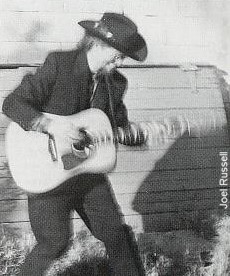
Mark Heard's last recorded work, the delightful, if ill-fated iDEoLA release
Tribal Opera, does not prepare the listener for the quiet richness and
acoustic warmth of his latest effort, Dry Bones Dance for his own Fingerprint label. To have a sense for the literate,
folky roots-rock that makes Heard's independent effort required listening, one has to have a
long memory, a penchant for reading album credits, or eyes that can pierce shadows.
Heard was announced to national Christian music circles in 1979 with
Appalachian Melody on Solid Rock, but came into his own with a series of releases on Home Sweet Home - Stop
the Dominoes, Victims of the Age, Eye of the Storm, Ashes and Light - and Mosaics, his'85 effort for Myrrh. Otherwise, Heard has been most visible as a producer and a
songwriter. Guided by keen intelligence and a remarkable melodic sense, Heard shaped words and music
that spoke to and from the human experience, always enriched his Christian perspective
and L'Abri-influenced understandings.
Heard manned the boards for the return to form of Randy Stonehill on
Return to Paradise and Until We Have Wings, and is currently recording the new Pierce Pettis effort
for Windham Hill. Two of Heard's songs, recorded for his newest collection, were covered on
projects he worked on: Stonehill did "Strong Hand of Love" and Phil Keaggy did "Everything Is
Alright" in the Sunday's Child session. Of course the most notable cover of a Heard song
was Leslie Phillips' "Heart of Hearts." Which leads to the most recent Heard sightings. Aside
from solo and band concerts on his own, Heard could be seen, or more likely heard, supporting
Sam Phillips on her tour opening for Cowboy Junkies, accompanying her on guitar and staying
just outside of the spotlight.
With little interest from major labels, Heard had resigned himself to not making records,
while working on the projects of others, until east coast concert promoter/manager Dan Russell setup a festival performance for Heard and suggested putting a band together, to include
Fergus Jemison Marsh (the Stick-player with Bruce Cockburn) and drummer David Birmingham.
Says Heard, "After the iDEoLA project, I had pretty much satisfied my curiosity around
that polyrhythmic kind of experimentation. I had been doing a lot of solo acoustic shows so
I started moving and writing in that direction. Most of the songs on Dry
Bones Dance were written for live performance and lend themselves to that. I wanted them to be
fairly simple and straight forward and translatable to acoustic shows."
Heard sees most of the lyrical emphasis in line with his previous endeavors. "Thematically
my concerns have remained fairly consistent over the years, although there are a little
more particular delvings into songs on human relationships and the like on
Dry Bones Dance, without trying to pontificate."
Admittedly, Mark Heard's music has always moved in and out of what fits comfortably
inside the parameters we set for "contemporary Christian music." Although his music is "contemporary"
and comes from a profoundly Christian perspective, Heard writes as much from experience
as anything. "Someone might classify the songs, as they are apt to do, and say that this one
is a theological song or this one is a song about human needs or a love song, but I see
it differently. The Christian music industry seems to generally encourage artists to be a
bucket with a hole poked in the bottom, so that the water runs right straight through. My
approach has been to not poke a hole in it and just let the water fill up and spill over as it
might. A lot of those things (ideas theological and human) are inseparable, it's not like it's
ever just a love song."
This is illustrated in "Lonely Road," a song that would tend to be classified in the
gospel music tradition. Heard notes, "It delves into human relationships as well, not only
pointing out what hardships are, compared to what we experience, but pointing out how far we fall
short and the ways in which we fall short, in attitude really, as well as action."
Dry Bones Dance finds the singer/songwriter at the top of his form. He even plays
some nifty accordion to add a down-home feel on several tracks. Asked about his development as
an artist, Heard responds, "It's a gradual, subtle, growing thing, where a songwriter
considers what he thinks he's doing right and what he's doing wrong and tries to hopefully expand
the one and suppress the other. I think most of it is not something I can quantify, most of it
is just a natural progression."
Brian Q. Newcomb ( CCM - In the News, November 1990 )
Copyright © 1990 CCM Magazine
INTERVIEWS & ARTICLES
ARCHIVE